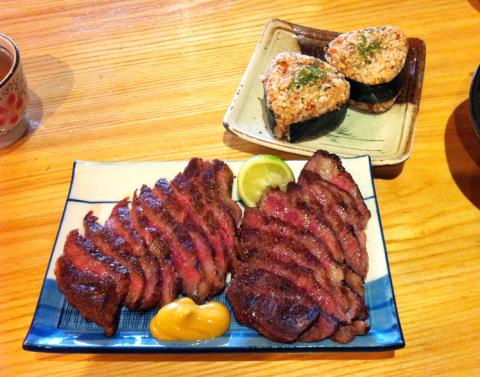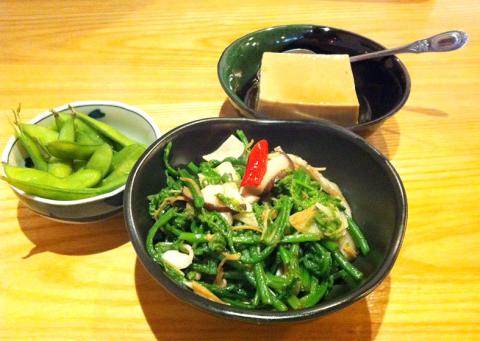Take your shoes off, eat light and leave feeling utterly satisfied after a visit to Weitzuman (味自慢), an izakaya near Jingmei MRT Station (景美捷運站). The izakaya, Japan’s version of a tapas bar, is meant to be an after-work destination where friends and colleagues share small, savory dishes and wash the food down with sake and beer. With its welcoming atmosphere and a menu of grilled, deep-fried and cold dishes, Weitzuman fits the description well.
The food is great. There was not one dud among the handful of dishes ordered on a recent visit. Fresh sashimi (NT$350 for a small plate, NT$480 for a large serving) is available as at most sit-down Japanese eateries, but there are many more interesting choices.
My dining companion and I did well by following the friendly waitstaff’s suggestions, which included several house recommendations listed on the menu. The “field mushrooms with mountain fern vegetable” (野菇山蕨, NT$160) was a delectable stir-fried dish, with thin and tenderly cooked slices of shitake and golden-needle mushrooms serving as a nice complement to the shanjuecai (山蕨菜), a vegetable with a crunchy stalk and a mild flavor.

Photo: David Chen, Taipei Times
The homemade sesame tofu (手工胡麻豆腐, NT$100) was a revelation: The dish arrived looking like a plain, ho-hum block of soft tofu, but were we in for a surprise. This concoction, made with crushed sesame seeds, had us laughing out loud with pleasure from the very first bite. The savory, nutty flavor of the sesame seeds was a perfect match for the creamy, mousse-like consistency of the tofu. Don’t leave the restaurant without trying it.
Weitzuman is refreshingly unpretentious and has the kind of down-home charm one might imagine of a traditional Japanese inn. Enter through sliding wooden doors, take a seat at the front and watch the chefs at work.
Large parties can sit cross-legged on benches in the front room or on cushions on an elevated wooden floor in the back. Either way, you’ll be taking off your shoes before taking your seat.

Photo: David Chen, Taipei Times
Adding to the relaxed, lived-in feel, the restaurant plays nakashi (那卡西) oldies, sung both in Japanese and Hoklo (commonly known as Taiwanese), at a civilized volume. Weitzuman has been at this location for eight years (it has been in the Jingmei area for 15 years), and you can tell that not much has changed: The wallpaper is faded and peeling a little, but the place is generally tidy, albeit a bit cluttered. Near the front door sit stacked boxes of beer: Tall bottles of Asahi are NT$130, Taiwan Beer is NT$100 and regular sized bottles of Heineken are NT$80. Sake is available and ranges from NT$180 to NT$680 per 300ml serving.
In general, the food portions for each dish are just enough for two persons. We ordered seven dishes, including miso soup (NT$50), and our lunch totaled around NT$850.
It was very much worth the price — our meal only got better. The “top grade beef steak” (特優牛小排, NT$280), thinly sliced and grilled so it was charred on the outside and red on the inside, was melt-in-your-mouth delicious. It came with a lemon wedge and yellow mustard (the kind you put on 7-Eleven hot dogs), which I initially scoffed at, but quickly changed my mind after a taste: They went together perfectly. The salmon onigiri (鮭魚飯糰, NT$80 for two), or rice balls with salmon flakes, is also worth a try, and the grilled shitake mushrooms (香菇串烤, NT$70), rounded out our meal nicely.
Reservations are recommended at Weitzuman, although we didn’t need one on Sunday afternoon, the only time of the week the restaurant is open for lunch.

Growing up in a rural, religious community in western Canada, Kyle McCarthy loved hockey, but once he came out at 19, he quit, convinced being openly gay and an active player was untenable. So the 32-year-old says he is “very surprised” by the runaway success of Heated Rivalry, a Canadian-made series about the romance between two closeted gay players in a sport that has historically made gay men feel unwelcome. Ben Baby, the 43-year-old commissioner of the Toronto Gay Hockey Association (TGHA), calls the success of the show — which has catapulted its young lead actors to stardom -- “shocking,” and says

The People’s Republic of China (PRC) invaded Vietnam in 1979, following a year of increasingly tense relations between the two states. Beijing viewed Vietnam’s close relations with Soviet Russia as a threat. One of the pretexts it used was the alleged mistreatment of the ethnic Chinese in Vietnam. Tension between the ethnic Chinese and governments in Vietnam had been ongoing for decades. The French used to play off the Vietnamese against the Chinese as a divide-and-rule strategy. The Saigon government in 1956 compelled all Vietnam-born Chinese to adopt Vietnamese citizenship. It also banned them from 11 trades they had previously

Inside an ordinary-looking townhouse on a narrow road in central Kaohsiung, Tsai A-li (蔡阿李) raised her three children alone for 15 years. As far as the children knew, their father was away working in the US. They were kept in the dark for as long as possible by their mother, for the truth was perhaps too sad and unjust for their young minds to bear. The family home of White Terror victim Ko Chi-hua (柯旗化) is now open to the public. Admission is free and it is just a short walk from the Kaohsiung train station. Walk two blocks south along Jhongshan

Snoop Dogg arrived at Intuit Dome hours before tipoff, long before most fans filled the arena and even before some players. Dressed in a gray suit and black turtleneck, a diamond-encrusted Peacock pendant resting on his chest and purple Chuck Taylor sneakers with gold laces nodding to his lifelong Los Angeles Lakers allegiance, Snoop didn’t rush. He didn’t posture. He waited for his moment to shine as an NBA analyst alongside Reggie Miller and Terry Gannon for Peacock’s recent Golden State Warriors at Los Angeles Clippers broadcast during the second half. With an AP reporter trailing him through the arena for an